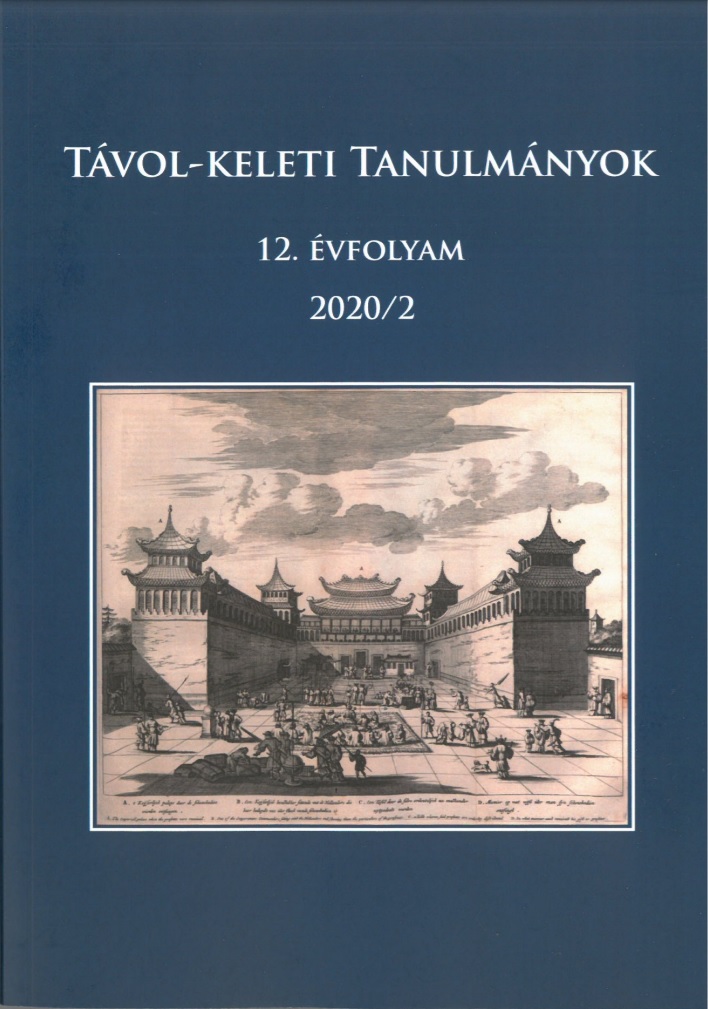Topics of debate between Mohists and Confucians in ancient China II.: Mohist criticism of Confucianism
Published 2021-07-12
Keywords
- Mohism,
- Confucianism,
- philosophical debate,
- fate,
- existence of spirits
How to Cite
Copyright (c) 2021 the author(s)

This work is licensed under a Creative Commons Attribution-NonCommercial 4.0 International License.
Abstract
It is a well-known fact in the history of Chinese philosophy that the 5th–4th centuries B.C. witnessed vigorous debates between Confucians and Mohists. We have three types of sources at our disposal reporting on the debates between representatives of these two groups: 1. External sources, which report on the debates from the point of view of external observers belonging to neither group; 2. Confucian sources, which predominantly contain Confucian criticism of Mohism; 3. Mohist sources, which in turn primarily detail the Mohist criticism of Confucian views. In the present study, I examine the third category.
References
- Lunheng 論衡: Cai Zhenchu 蔡鎮楚 (komm.) 2012. Xinyi Lunheng duben 新譯論衡讀 本. I-II. Taibei: Sanmin shuju.
- Lunyu 論語: Yang Bojun 杨伯峻 (komm.) 1980. Lunyu yizhu 論語譯注. Beijing: Zhonghua shuju.
- Mozi 墨子: Johnston 2010.
- Brindley, Erica Fox 2010. Individualism in Early China: Human Agency and the Self in Thought and Politics. Honolulu: University of Hawai‘i Press.
- Brown, Miranda 2007. The Politics of Mourning in Early China. Albany, NY: SUNY Press.
- Carr, Michael 1992. „Shamanic Heng 恆, ‘Constancy’.” Otaru Shōka Daigaku jinbun kenkyū 小樽商科大学人文研究 83: 93–159.
- Chen Ning 2003. Mohist, Daoist, and Confucian explanations of Confucius’s suffering in Chen-Cai.” Monumenta Serica 51: 37–54.
- Chen Zhi 陳致 2008. „Wan wu yu Yong zou: Shangdai jisi yuewu yu Shijing zhong de san song 萬舞與庸奏: 商代祭祀樂舞與詩經中的三頌 [A Wan tánc és a Yong zenei előadás: Áldozati zene és tánc a Shang-dinasztia idején és a Dalok könyvének három dicshimnusza].” Zhonghua wenshi luncong 中华文史论丛 2008/4: 35–63.
- Csikszentmihalyi, Mark 2004. Material Virtue: Ethics and the Body in Early China. (Sinica Leidensia) Leiden: Brill.
- Ding Sixin 2011. „A Study on the Dating of the Mozi Dialogues and the Mohist View of Ghosts and Spirits.” Contemporary Chinese Thought 42/4: 39–87.
- Fingarette, Herbert 1972. Confucius: The Secular as Sacred. New York: Harper and Low.
- Fraser, Chris 2013. „The Ethics of the Mohist Dialogues.” In: Carine Defoort and Nicolas Standaert (eds.): The Mozi as an Evolving Text: Different Voices in Early Chinese Thought. (Studies in the History of Chinese Texts, vol. 4. ) Leiden: E. J. Brill, 175–204.
- Gibas, Piotr 2017. „Mozi and the Ghosts: The Concept of Ming 明in Mozi’s “Ming gui” 《明鬼》.” Early China 40: 89–123.
- Hsiao, Kung-chuan 1979. A History of Chinese Political Thought, vol. 1: From the Beginnings to the Sixth Century A.D. [Trans. F W. Mote] Princeton: Princeton University Press.
- Johnston, Ian 2010. The Mozi: A Complete Translation. Hong Kong: The Chinese University Press.
- Kern, Martin 2017. „Language and the Ideology of Kingship in the “Canon of Yao”.” In: Yuri Pines – Paul R. Goldin – Martin Kern (eds.): Ideology of Power and Power of Ideology in Early China. Leiden: Brill, 23–61.
- Knoblock, John 1988. Xunzi: A Translation and Study of the Complete Works. Vol. I. Books 1–6. Stanford: Standford University Press.
- Kósa Gábor 2019. „Kultúrhéroszok vagy hivatalnokok? Feltaláló-listák a Lüshi chunqiu 17. könyvében.” Távol-keleti Tanulmányok 9/1: 33–61.
- Kósa Gábor 2020. „Motisták és konfuciánusok vitatémái az ókori Kínában I. Konfuciánus kritika a motistákkal szemben.” Távol-keleti Tanulmányok 12/1: 5–31.
- Lai, Whalen 1993. „The public good that does the public good: A new reading of Mohism.” Asian Philosophy: An International Journal of the Philosophical Traditions of the East 3/2: 125–141.
- Nylan, Michael 2009. „Kongzi and Mozi, the Classicists (Ru 儒) and the Mohists (Mo 墨) in Classical-Era Thinking.” Oriens Extremus 48: 1–20.
- Perkins, Franklin 2008. „The Moist Criticism of the Confucian Use of Fate.” Journal of Chinese Philosophy 35/3: 421–436.
- Smith, Kidder 2003. „Sima Tan and the Invention of Daoism, “Legalism,” et cetera.” The Journal of Asian Studies 62/1: 129–156.
- Sterckx, Roel 2013. „Mozi 31: Explaining Ghosts, Again.” In: Carine Defoort – Nicolas Standaert (eds.): The Mozi as an Evolving Text: Different Voices in Early Chinese Thought. (Studies in the History of Chinese Texts, vol. 4. ) Leiden: E. J. Brill, 95–141.
- Tőkei Ferenc 2005a. Kínai filozófia – Ókor I. Budapest: Magiszter Társadalomtudományi Alapítvány.
- Tőkei Ferenc 2005b. Kínai filozófia – Ókor II. Budapest: Magiszter Társadalomtudományi Alapítvány.
- Tőkei Ferenc 2005c. Kínai filozófia – Ókor III. Budapest: Magiszter Társadalomtudományi Alapítvány.
- Van Norden, Bryan W. 2007. „Mozi and Early Mohism.” In: Virtue Ethics and Consequentialism in Early Chinese Philosophy. Cambridge: Cambridge University Press, 139–198.
- Vorenkamp, Dirck 1992. „Another look at utilitarism in Mo-tzu’s thought.” Journal of Chinese Philosophy 19/4: 423–443.

